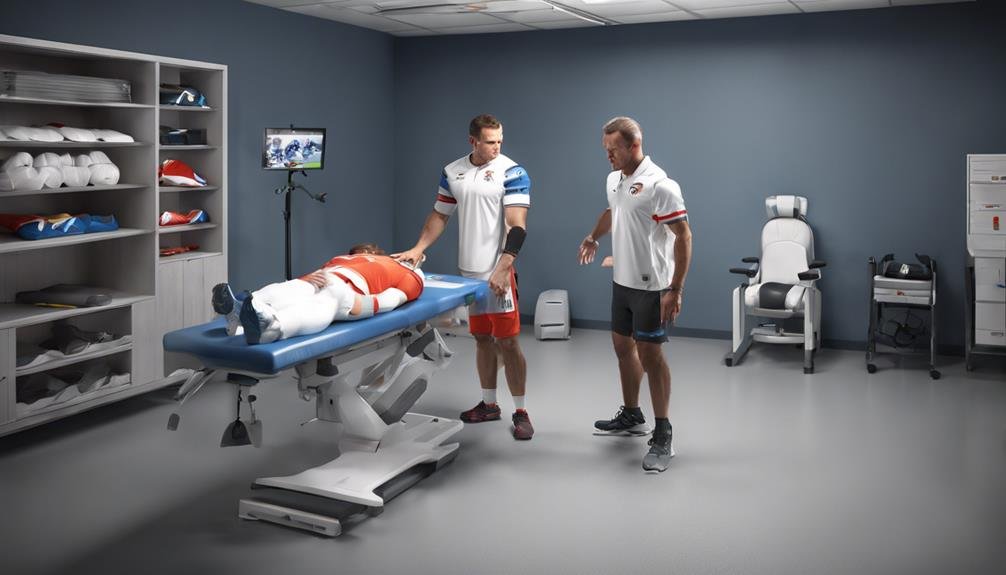Concussion Management Programs: Safeguarding Brain Health
Did you know that approximately 1.6 to 3.8 million sports-related concussions occur each year in the United States alone? Understanding the importance of concussion management programs in safeguarding brain health is essential, especially when considering the long-term implications of head injuries. By exploring the key components of these programs and the collaborative efforts involved in ensuring proper care and monitoring, you can gain valuable insights into how advancements in concussion management are shaping the landscape of brain injury prevention and treatment.
Key Takeaways
- Implement evidence-based protocols for optimal outcomes.
- Utilize continuous symptom tracking for early intervention.
- Emphasize interdisciplinary teamwork for holistic care.
- Integrate brain injury prevention strategies into programs.
- Evolve programs through collaboration for ongoing improvement.
Importance of Concussion Management
Understanding the significance of proper concussion management is crucial in safeguarding athletes' long-term health and well-being. Brain injury prevention is a critical aspect of sports safety, especially considering the potential long-term effects of concussions.
When athletes experience concussions, the brain undergoes trauma that can lead to various issues if not managed correctly. Long-term effects such as cognitive impairment, memory problems, and even mood disorders can arise from repeated concussions or improper management of initial head injuries.
This underscores the importance of implementing effective concussion management programs that prioritize the health and safety of athletes. By focusing on timely diagnosis, appropriate treatment, and gradual return-to-play protocols, these programs aim to reduce the risk of long-term complications associated with concussions.
Prioritizing brain health through thorough concussion management not only protects athletes during their sporting careers but also ensures their well-being beyond the field or court.
Components of a Comprehensive Program
To develop a thorough concussion management program, it's essential to outline specific components that address various aspects of athlete safety and well-being. One important element is the establishment of clear return-to-play guidelines. These guidelines should be based on the latest medical recommendations and guarantee that athletes only return to their sport when it's safe to do so. Additionally, incorporating cognitive rest strategies is critical to allow the brain the necessary time to heal post-concussion.
A holistic program should adopt a multidisciplinary approach, involving various healthcare professionals such as physicians, athletic trainers, and neuropsychologists. This collaboration ensures that the athlete receives comprehensive care that considers both the physical and cognitive aspects of recovery. Neuropsychological testing techniques play a pivotal role in evaluating cognitive function post-injury. These tests provide valuable insights into the athlete's cognitive abilities, aiding in determining when it's safe for them to return to play.
Role of Healthcare Professionals
You'll explore the significance of healthcare team collaboration and patient education initiatives in concussion management programs. These points are essential in ensuring a thorough approach to addressing concussions effectively.
Healthcare Team Collaboration
Collaboration among healthcare professionals plays an essential role in the effective management of concussions within all-encompassing concussion management programs.
Teamwork strategies are important for ensuring that each healthcare professional, whether it be physicians, nurses, athletic trainers, or neuropsychologists, can bring their expertise together to provide thorough care for individuals with concussions.
Interdisciplinary communication is key in this collaboration, as it allows for the seamless sharing of information, treatment plans, and progress updates among the team members involved in the care of the concussed individual.
Patient Education Initiatives
In providing thorough care for individuals with concussions, healthcare professionals play an essential role in implementing patient education initiatives to enhance understanding and promote recovery. Community workshops serve as valuable platforms for disseminating information about concussion management, symptoms, and the importance of seeking timely medical attention. Online resources offer easy access to educational materials, self-assessment tools, and guidelines for both patients and their families.
Family involvement is vital in the recovery process. Healthcare professionals emphasize the need for support networks to aid in the management of post-concussion symptoms. Educating families about the potential challenges individuals with concussions may face, such as cognitive difficulties or mood changes, enables them to provide the necessary care and understanding.
Implementing Evidence-Based Protocols
To successfully implement evidence-based protocols in concussion management programs, it's vital to establish a clear framework for protocol adherence and monitoring. Protocol adherence ensures that the latest research updates are incorporated into patient care effectively. By following evidence-based protocols, healthcare providers can optimize patient outcomes and minimize the risk of long-term complications associated with concussions.
Ensuring protocol adherence involves creating standardized procedures for diagnosis, treatment, and follow-up care based on the most current research findings. This includes guidelines for when to return to physical activity, work, and school post-injury. Regularly reviewing and updating protocols in line with new research is essential to providing the best possible care to individuals with concussions.
Healthcare teams must educate all members on the importance of following these evidence-based protocols consistently. Implementing systems for monitoring protocol adherence helps identify any areas needing improvement and ensures that patients receive the most effective care available. By prioritizing protocol adherence and staying up-to-date with research updates, concussion management programs can safeguard brain health and enhance patient outcomes.
Monitoring and Follow-Up Procedures
You need to prioritize regular check-ins following a concussion to monitor progress effectively.
Continuous tracking of symptoms is vital in evaluating the recovery trajectory accurately.
These procedures guarantee that any necessary adjustments to the management plan can be made promptly.
Regular Check-Ins Post-Concussion
Regularly scheduled check-ins post-concussion play an important role in monitoring progress and ensuring appropriate follow-up procedures are implemented. These check-ins are essential for tracking recovery progress and symptom management to determine if the individual is improving as expected or if any additional intervention is needed.
During these check-ins, healthcare providers assess various factors, including cognitive function, physical symptoms, emotional well-being, and overall quality of life. By closely monitoring these aspects, professionals can make informed decisions about treatment adjustments, rehabilitation strategies, and return-to-activity timelines.
Additionally, regular check-ins provide an opportunity for individuals to discuss any concerns, ask questions, and receive guidance on managing their symptoms effectively. This ongoing support and communication between the individual and the healthcare team are crucial for promoting successful recovery and preventing potential complications.
Continuous Symptom Tracking
Guarantee thorough monitoring of symptoms and implement appropriate follow-up procedures to track recovery progress effectively after a concussion. Symptom progression plays a crucial role in understanding the severity of a concussion and guiding treatment decisions. By utilizing data collection techniques, healthcare providers can track changes in symptoms over time, allowing for personalized care tailored to individual needs. Regular symptom assessments enable the identification of any worsening symptoms promptly, prompting timely intervention to prevent potential complications.
Technology integration has revolutionized continuous symptom tracking post-concussion. Various apps and wearable devices offer convenient ways to monitor symptoms regularly and record relevant data for analysis. These tools not only streamline the tracking process but also provide healthcare professionals with real-time insights into a patient's recovery journey. By leveraging technology, healthcare providers can offer more efficient and effective care, ensuring that any concerning developments are addressed promptly.
Incorporating continuous symptom tracking into concussion management programs enhances patient outcomes by facilitating early intervention and personalized treatment strategies. By staying vigilant and proactive in monitoring symptoms, individuals can receive the necessary support to navigate their recovery journey successfully.
Collaborative Approach to Brain Health
Implementing a collaborative approach to brain health within concussion management programs enhances holistic care and support for individuals recovering from head injuries. Interdisciplinary teamwork plays a crucial role in guaranteeing all-encompassing care for those affected by concussions. By bringing together professionals from various fields such as neurology, sports medicine, psychology, and physical therapy, concussion management programs can offer a more thorough and effective approach to treatment. This collaborative effort allows for a more in-depth understanding of each patient's unique needs and ensures that all aspects of their recovery are addressed.
Moreover, this approach extends to brain injury prevention strategies. By working together, experts can develop and implement proactive measures to reduce the risk of concussions in various settings, such as sports, workplaces, and everyday activities. This preventive aspect of the collaborative approach emphasizes the importance of not only treating but also minimizing the occurrence of head injuries. Through ongoing collaboration and communication, concussion management programs can continuously evolve and improve, ultimately safeguarding the brain health of individuals now and in the future.
Conclusion
As you navigate the intricate pathways of concussion management programs, envision a tapestry of care woven with evidence-based protocols, vigilant monitoring, and collaborative expertise.
Picture a team of healthcare professionals standing as guardians, safeguarding brain health with personalized strategies and unwavering dedication.
In this landscape of healing, every step taken towards recovery is a brushstroke of resilience and determination, painting a portrait of hope and well-being for those affected by head injuries.







